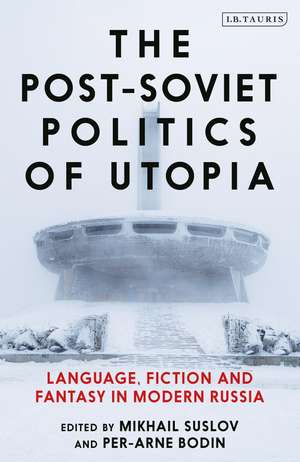The Post-Soviet Politics of Utopia: Language, Fiction and Fantasy in Modern Russia
Editat de Mikhail Suslov, Per-Arne Bodinen Limba Engleză Hardback – 18 sep 2019
| Toate formatele și edițiile | Preț | Express |
|---|---|---|
| Paperback (1) | 219.46 lei 6-8 săpt. | |
| Bloomsbury Publishing – 24 mar 2021 | 219.46 lei 6-8 săpt. | |
| Hardback (1) | 658.11 lei 6-8 săpt. | |
| Bloomsbury Publishing – 18 sep 2019 | 658.11 lei 6-8 săpt. |
Preț: 658.11 lei
Preț vechi: 944.07 lei
-30% Nou
Puncte Express: 987
Preț estimativ în valută:
125.94€ • 131.32$ • 104.67£
125.94€ • 131.32$ • 104.67£
Carte tipărită la comandă
Livrare economică 21 martie-04 aprilie
Preluare comenzi: 021 569.72.76
Specificații
ISBN-13: 9781788312288
ISBN-10: 1788312287
Pagini: 376
Dimensiuni: 138 x 216 x 28 mm
Greutate: 0.59 kg
Editura: Bloomsbury Publishing
Colecția I.B.Tauris
Locul publicării:London, United Kingdom
ISBN-10: 1788312287
Pagini: 376
Dimensiuni: 138 x 216 x 28 mm
Greutate: 0.59 kg
Editura: Bloomsbury Publishing
Colecția I.B.Tauris
Locul publicării:London, United Kingdom
Caracteristici
The first academic volume to consider the intersection of politics, ideologies and fantasies in the post-Soviet world.
Notă biografică
Per-Arne Bodin is Professor of Slavic Languages at Stockholm University. Mikhail Suslov is Assistant Professor of Russian History and Politics at University of Copenhagen.
Cuprins
INTRODUCTION: Per-Arne Bodin and Mikhail Suslov PART 1Chapter 1: Alternative Russian Revolution: Viacheslav Rybakov and Kir Bulychev, Go Koshino Chaper 2: Ressentiment and post-traumatic syndrome in Russian post-Soviet speculative fiction: Two trends, Maria Galina Chapter 3: Telluro-Cosmic Imperial Utopia and Contemporary Russian Art, Maria Engström Chapter 4: Lazarus on the Ark: Heterotopias in the Novels of Vladimir Sharov and Evgenii Vodolazkin, Muireann MaguirePART 2Chapter 5: Conservative science fiction in contemporary Russian literature and politics, Mikhail Suslov Chapter 6: Othering Russia: Eduard Limonov's Retrofuturistic (Anti-) Utopia, Andrei Rogatchevski Chapter 7: Religio-political utopia by Iana Zavatskaia, Anastasia V. Mitrofanova Chapter 8: "Respectable Xenophobia:"Science Fiction, Utopia and Conspiracy, Viktor Shnirel'manPART 3Chapter 9: Church Slavonic in Russian dystopias and utopias, Per-Arne Bodin Chapter 10: Contested Utopias: Language Ideologies in Valerii Votrin's Logoped, Ingunn Lunde Chapter 11: 'Londongrad' as a Linguistic Imaginary: Russophone migrants in the UK in the work of Michael Idov and Andrei Ostalsky, Lara Ryazanova-ClarkePART 4Chapter 12: 'Provinces, Piety, and Promotional Putinism: Mapping Aleksandr Prokhanov's Counter-Utopian Russia', Edith W. Clowes Chapter 13: Parameters of Space-Time and Degrees of (Un)-Freedom: Dmitry Bykov's ZhD, Sofya Khagi Chapter 14: The new "norma": Vladimir Sorokin's Telluria and post-utopian science fiction, Mark LipovetskyAFTERWARD: Back to the Future, Forward to the Past? An Afterword on Explorations in Russian Science Fiction and Fantasy, Kåre Johan Mjør, Sanna TuromaSELECTED BIBLIOGRAPHY INDEX
Recenzii
Suslov and Bodin have assembled a comprehensive guide to some very strange (but very fascinating) worlds. Some of them are frightening to visit, but the book's readers could not be in better hands.
Speculative fiction does not just imagine the future of Putin's Russia - one of its primary tasks is to process the traumatic legacy of the Soviet Union's collapse. Thus it is not a coincidence, or a trick of marketing, that makes speculative fiction of all sorts (utopian, dystopian, science fiction, fantasy, alt-history, horror) the most widely read literature in Russia today. This volume is a much-needed guide to key authors and trends in post-Soviet utopian writing.
Speculative fiction does not just imagine the future of Putin's Russia - one of its primary tasks is to process the traumatic legacy of the Soviet Union's collapse. Thus it is not a coincidence, or a trick of marketing, that makes speculative fiction of all sorts (utopian, dystopian, science fiction, fantasy, alt-history, horror) the most widely read literature in Russia today. This volume is a much-needed guide to key authors and trends in post-Soviet utopian writing.
